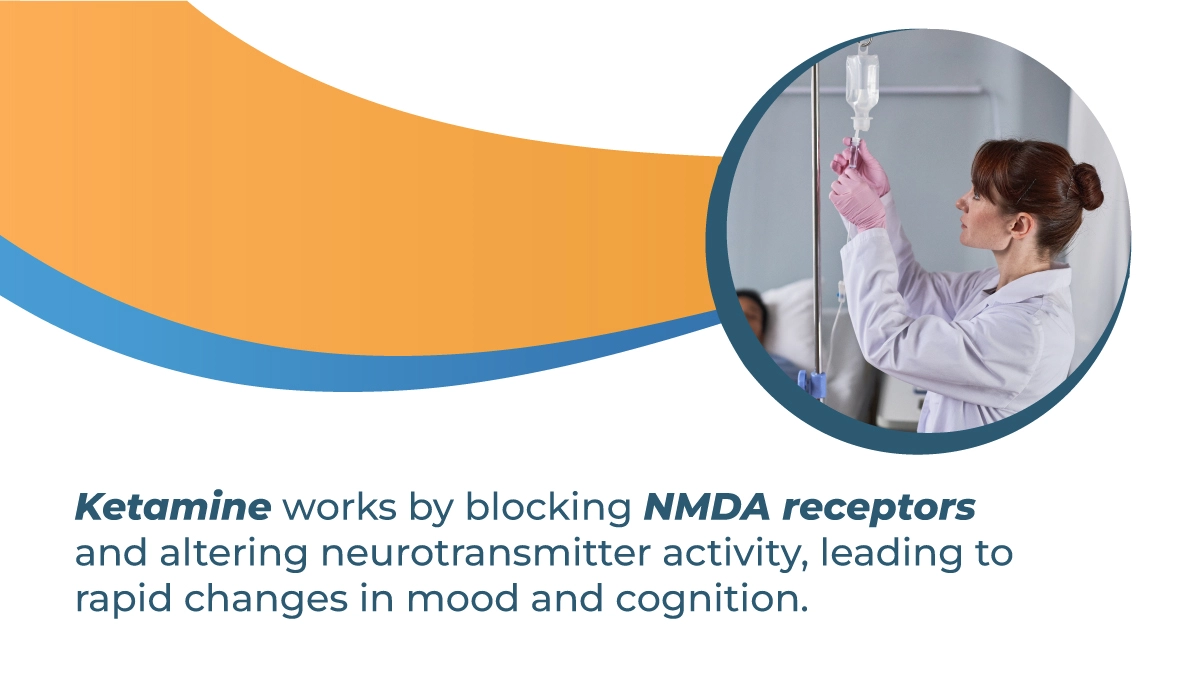
Lyrica With Suboxone: Risks And Safe Practices
The Recovery Team-Newton explores whether taking Lyrica with Suboxone is safe. Explore potential risks and guidelines

Ketamine therapy has emerged as a promising option for managing anxiety, offering new hope for many individuals. This treatment, initially used for anesthesia, is now being explored for its potential benefits in mental health.
Ketamine works by influencing brain chemistry, which can help alleviate symptoms of anxiety that might not respond to traditional therapies. By targeting specific neurotransmitter systems, ketamine therapy provides a novel approach to mental wellness.
In this article, we will explore the science behind ketamine therapy, how it helps with anxiety, and what to expect from this innovative treatment.
Ketamine therapy represents a new method for treating anxiety, surpassing conventional approaches. Here’s what you need to know:
The Recovery Team-Newton offers personalized care, focusing on innovative treatments and recovery support. For more information, call (508) 978-2772.

Ketamine therapy provides a novel approach to managing anxiety, expanding beyond traditional treatments. Initially used as an anesthetic since the 1960s, ketamine has gained attention for its potential in mental health care.
Research has highlighted its rapid-acting benefits for mood disorders, leading to increased interest in its use for anxiety. This shift reflects ketamine’s promising role in offering relief where other therapies may not be effective. As ongoing studies continue, ketamine’s ability to provide effective and swift relief is becoming more recognized in treating anxiety.
Initially, ketamine was used primarily for anesthesia and pain management. In recent years, its potential for curing treatment-resistant depression and anxiety has become more apparent. Clinical trials have explored its effects on various mental health conditions.
Ketamine differs from traditional therapies in its action and onset of relief method. Unlike many conventional treatments, ketamine can produce rapid effects. Traditional therapies often require weeks to show results, while ketamine may offer quicker relief.
Anxiety disorders are prevalent and can significantly impact daily life. This section provides insight into different types of anxiety disorders, common symptoms, and their effects on daily functioning.
Anxiety disorders encompass a range of conditions, including generalized anxiety disorder (GAD), panic disorder, and social anxiety disorder. Generalized anxiety disorder (GAD) involves persistent and excessive worry about various aspects of life. Sudden and intense panic attacks characterize panic disorder. Social anxiety disorder involves intense fear of social situations.
Common symptoms of anxiety disorders include excessive worry, restlessness, and physical symptoms such as increased heart rate. Individuals may also experience difficulty concentrating and sleep disturbances. Symptoms can vary in severity, impacting the overall quality of life. Anxiety may lead to avoidance of certain situations or places.
Anxiety disorders affect millions of people worldwide, making them one of the most common mental health conditions. The impact on daily life can significantly affect work, relationships, and overall well-being. Individuals may struggle with performing routine tasks or participating in social activities.
Ketamine’s mechanism of action is complex but essential for its effectiveness in treating anxiety. This section explains how ketamine affects the brain, its role as an N-methyl-D-aspartate (NMDA) receptor antagonist, and its influence on neuroplasticity.
Ketamine affects the brain by influencing neurotransmitter systems, particularly glutamate. It alters the activity of synaptic connections, which can impact mood and perception.
The treatment can lead to changes in brain function that help alleviate anxiety. This action differs from traditional therapies that primarily target serotonin and norepinephrine.
Ketamine is an N-methyl-D-aspartate (NMDA) receptor antagonist that blocks specific receptors in the brain. This action helps to modulate glutamate levels, which play a role in mood regulation. By inhibiting these receptors, ketamine can help rebalance brain activity. This effect contrasts with many traditional medications that influence different neurotransmitter systems.
Ketamine influences neuroplasticity, the brain’s ability to adapt and change. By affecting synaptic connections, it can promote positive changes in brain function. Enhanced neuroplasticity is associated with improved mood and reduced anxiety symptoms. This process differs from the effects of traditional treatments, which may not directly impact neuroplasticity.
Clinical evidence supports ketamine’s potential in treating anxiety, with various studies and trials highlighting its benefits. This section reviews research findings, compares ketamine to placebo and traditional therapies, and examines long-term efficacy and safety.
Research on ketamine for anxiety has shown promising results in several studies. Trials have demonstrated that ketamine can reduce anxiety symptoms more rapidly than traditional treatments. Studies also indicate that ketamine can be effective for individuals who do not respond to other therapies.
Comparative studies have found that ketamine often outperforms placebo in reducing anxiety symptoms. When compared to traditional therapies, ketamine typically offers faster relief.
However, traditional treatments may still be effective for many individuals. The choice between ketamine and conventional therapies depends on individual needs and responses.
The long-term efficacy and safety of ketamine therapy are areas of active research. Studies suggest that ketamine can provide sustained relief for anxiety, though its long-term effects require further investigation. Safety data indicates that ketamine is generally well-tolerated, with manageable side effects.
Ketamine can be administered through various methods, each with specific protocols and considerations. This section discusses the different administration methods, dosage guidelines, and the importance of monitoring and follow-up care.
Ketamine for anxiety can be administered via intravenous (IV) infusion, intramuscular (IM) injection, or nasal spray. IV administration provides precise control over dosage and allows for rapid onset.
IM injections offer a convenient alternative for those who prefer not to use an IV. Nasal spray is a non-invasive option that can be used in outpatient settings.
The dosage for ketamine treatment varies depending on the administration method and individual response. Typical protocols involve a series of initial treatments followed by maintenance doses. The specific dosage is tailored to each patient’s requirements and response to therapy. Treatment schedules are designed to maximize benefits while minimizing side effects.
Monitoring during ketamine therapy is essential to ensure safety and effectiveness. After each session, patients are observed for immediate and potential side effects.
Follow-up care involves regular assessments to evaluate progress and make necessary adjustments. Communication with healthcare providers helps address any concerns and optimize treatment.
Ketamine therapy offers several benefits, particularly for individuals with treatment-resistant anxiety. This section highlights the rapid onset of relief, its effectiveness in complex cases, and its impact on suicidal thoughts.
One of the significant benefits of ketamine therapy is its rapid onset of relief. Many patients experience noticeable improvements within hours of treatment. This quick response can be precious for those without relief from traditional therapies. Rapid relief helps improve overall quality of life and supports emotional well-being.
Ketamine has shown effectiveness in cases where other treatments have failed. It provides an alternative for individuals who have not responded to conventional therapies. This effectiveness makes ketamine a valuable option in challenging situations. Its ability to offer relief in treatment-resistant cases highlights its role in expanding available treatment options.
Ketamine therapy has been associated with a reduction in suicidal thoughts for some individuals. Its rapid action can provide critical support in acute situations. The treatment’s effects on mood and cognition can help alleviate severe distress. Addressing suicidal thoughts effectively is a crucial aspect of comprehensive mental health care.
Like any treatment, ketamine therapy carries risks and potential side effects. This section outlines common side effects, serious risks, and strategies for managing side effects.
Common side effects of ketamine therapy may include dizziness, nausea, and dissociation. These effects are typically short-lived and resolve after treatment. Some individuals may experience mild hallucinations or altered perceptions. Side effects are generally manageable and should be discussed with a healthcare provider.
While ketamine is generally well-tolerated, there are severe risks and contraindications to consider. These may include cardiovascular issues and interactions with other medications. Patients with certain medical conditions may need to avoid ketamine therapy.
Managing side effects involves monitoring and adjusting treatment as needed. Healthcare providers can offer strategies to mitigate common side effects.
Communication with the provider helps address any issues that arise during therapy. Adjustments to dosage or administration methods may be necessary to enhance comfort.
Ketamine therapy involves various ethical and legal considerations. This section covers regulatory status, legal restrictions, and moral concerns associated with treatment.
Ketamine is approved for use in anesthesia and is increasingly recognized for its potential in mental health treatment. The regulatory status for its use in anxiety treatment varies by region and may be subject to change.
In the United States, ketamine is generally administered off-label for anxiety and depression. Regulatory guidelines help ensure the safe and effective use of the therapy. Staying informed about regulatory updates is vital for healthcare providers and patients.
Legal restrictions on ketamine therapy can vary, affecting access and use. In some cases, regulations may limit its availability or require specific protocols for administration.
Learning these restrictions helps in navigating treatment options and ensuring compliance. Legal considerations play a role in shaping how ketamine therapy is provided.
Ethical concerns in ketamine therapy include ensuring informed consent and addressing potential misuse. Transparent information about treatment options and possible risks is essential.
Ethical considerations also involve monitoring for any signs of dependency or misuse. Balancing the benefits and risks of treatment is essential for ethical practice.
The future of ketamine therapy holds promising possibilities, with ongoing research exploring new applications and innovations. This section looks at ongoing studies, potential broader applications, and innovations in delivery methods.
Ongoing studies continue to investigate ketamine’s effectiveness and safety in treating anxiety and other mental health conditions. Research focuses on optimizing treatment protocols and understanding long-term effects.
Clinical trials are exploring new dosing strategies and combinations with other therapies. These studies aim to expand knowledge and improve treatment outcomes.
The potential for ketamine extends beyond anxiety to other mental health conditions, such as depression and post-traumatic stress disorder (PTSD). Researchers are exploring its use in various therapeutic contexts.
Broader applications could enhance treatment options for a range of mental health issues. Expanding its use could provide new solutions for challenging mental health conditions.
Innovations in ketamine delivery methods are underway to improve accessibility and patient comfort. Advances include novel formulations and alternative administration routes. These innovations aim to enhance the ease and effectiveness of treatment.
New methods could provide more options for patients and streamline treatment processes. Staying updated on these developments supports better treatment planning and implementation.
Ketamine therapy, including ketamine infusions, offers a novel approach to treating anxiety and major depression. This therapy uses ketamine, such as intranasal esketamine, sublingual tablets, or intramuscular injections, to target glutamate receptors and enhance synaptic plasticity.
Doctors have observed significant improvement in many patients, mainly when traditional antidepressants and cognitive behavioral therapy (CBT) haven’t been effective. Ketamine’s anti-anxiety effects can address severe depression and suicidal ideation. New research supports ketamine’s role in managing an array of anxiety disorders and obsessive-compulsive disorders, though healthcare providers must monitor potential risks.
Ketamine therapy differs from traditional anxiety treatments in several essential ways. Ketamine acts quickly, often showing results within hours, while conventional methods like SSRIs may take weeks. Ketamine can target different brain pathways, offering relief when other treatments are ineffective. This therapy is administered under medical supervision, ensuring controlled and safe use.
Traditional treatments often involve ongoing medication management and therapy sessions. Ketamine therapy might be used when conventional approaches do not yield the desired outcomes. Both approaches aim to improve mental health, but ketamine offers an alternative for those needing faster or different relief options.
At The Recovery Team-Newton, we conquer addiction challenges with innovation and compassion.
Dive into our medication-assisted treatment, where cutting-edge medications support your journey to recovery by easing withdrawal and cravings. Experience the transformative power of our intensive outpatient program, offering structured support and therapy tailored to your needs, helping you rebuild your life while balancing daily responsibilities. Embrace the potential of ketamine treatment, a groundbreaking approach that swiftly relieves anxiety by enhancing brain connectivity.
Call us today at (508) 978-2772 to start your personalized journey toward a brighter future.

The Recovery Team-Newton explores whether taking Lyrica with Suboxone is safe. Explore potential risks and guidelines

Learn about Suboxone injection side effects and explore recovery solutions in this guide by The Recovery Team-Newton.